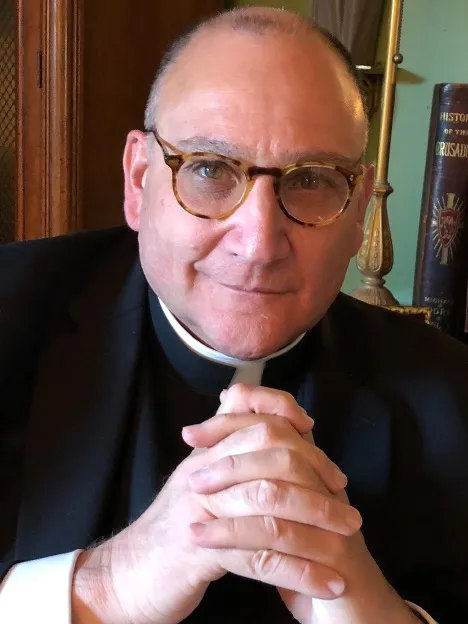
Washington, D.C. Newsroom, Sep 14, 2021 / 16:19 pm (CNA).
Twenty years ago, Father John A. Perricone sat down at his desk in the rectory of St. Agnes Catholic Church in midtown Manhattan and began to write.
“I sit here writing this piece coughing on the fumes of hell,” is how he began.
It was Sept. 14, 2001. Three days earlier, Islamic terrorists crashed two airliners into the World Trade Center, setting off a cataclysmic chain reaction that killed more than 3,000 people and reduced the iconic Twin Towers to a smoldering, toxic pire.
Then a professor of philosophy at St. Francis College in Brooklyn, Father Perricone lived at St. Agnes, a historic parish located across the street from the Chrysler Building and a half block from Grand Central Terminal.
Like other city residents, and the nation as a whole, he was still struggling to process what had just happened. Others felt compelled to write about the tragic loss of life, or the heroism of first responders.
Father Perricone wrote about evil.
“Though I sit some one hundred blocks from ground zero of Manhattan Island, the winds shift and billows of that smoke of death stretch all the way to my room at St. Agnes rectory — and to every one of you, wherever you sit in this beloved nation of ours, now supine before an Islamic monster,” he wrote.
“For the evil that growls at us now sits on the doorstep of every person in America, and of the world. More importantly, it proves to over-intellectualized Americans that indeed evil exists. It kills. It corrupts. It demands a daily war against it, sometimes even requiring our blood.”
A prolific writer and lecturer, Father Perricone shared his words with friends and others in his social circle. But his reflections weren’t widely read until Saturday, the 20th anniversary of 9/11, when Crisis magazine published his essay, “9/11/01: Hell in Manhattan,” for the first time.
In an interview with CNA Tuesday, Father Perricone said that re-reading his writing 20 years later, he was struck by how mistaken he had been at the time to believe that 9/11 would somehow bring America to its senses about the reality of sin and evil, and the need for God.
“I thought naively … that maybe this jolt, like Pearl Harbor, might help people to see things differently and to shake off some of this grinding secularism that was pulverizing their souls,” he said.
“And I was completely wrong.”

Father Perricone recalled how his noon Mass at St. Agnes that Sept. 11 was packed with people, many of them caked in ash from the towers’ collapse.
The need to pray and the desire for God remained strong for many days and weeks, he said. But it proved ephemeral.
Writing 20 years ago, he observed, “Words like ‘sin,’ ‘Satan,’ ‘saintliness,’ and ‘virtue’ have all been made to sound slightly eccentric by secularism’s totalizing reach. It is no surprise that it has tunneled deep within religion itself. More than a few priests are slightly embarrassed by the vocabulary of religion.”
What was true in 2001 is even more true today, he believes, after two decades marked by a steady loss of faith and ever-rising secularism.
“I never thought our beloved America would worsen, but it has,” Father Perricone told CNA. “I mean, not by degrees, by magnitude.”
How so?
“We’re still addicted to that notion that evil is just a psychological syndrome,” he explained, ‘[that] evil is simply not evil, it’s some social mechanism gone wrong.”
That is not now, and has never been, the Catholic worldview, he noted.
Today, Father Perricone resides at Sacred Heart parish in Clifton, New Jersey, and he celebrates the Traditional Latin Mass at Our Lady of Sorrows Catholic Church in Jersey City.
Many of those who attend his Masses are Catholics in their twenties or thirties with only hazy memories of 9/11. What draws these young adults to the Traditional Latin Mass?
“The absolute certitude of the Catholic faith, the granite-like truth that the Church has preached for 2,000 years and never changed,” he replied. “They’re hungry for that.”
That desire suggests that, deep down, many today still search for answers that secularism can’t provide. But redeeming our culture will take time; there are no “quick fixes,” Father Perricone emphasized.
“We need those great, heroic bishops, like John Chrysostom, and Gregory of Nyssa, Gregory the Great, Leo the Great. At that time, at the dying of the Roman Imperium, they were the superstars. The people were led by their bishops; they adored them. … They looked to them for their strength, and they looked to them for rebuilding.
“And, indeed, Western civilization was rebuilt,” he said.
“We desperately need that today.”
If you value the news and views Catholic World Report provides, please consider donating to support our efforts. Your contribution will help us continue to make CWR available to all readers worldwide for free, without a subscription. Thank you for your generosity!
Click here for more information on donating to CWR. Click here to sign up for our newsletter.






Leave a Reply